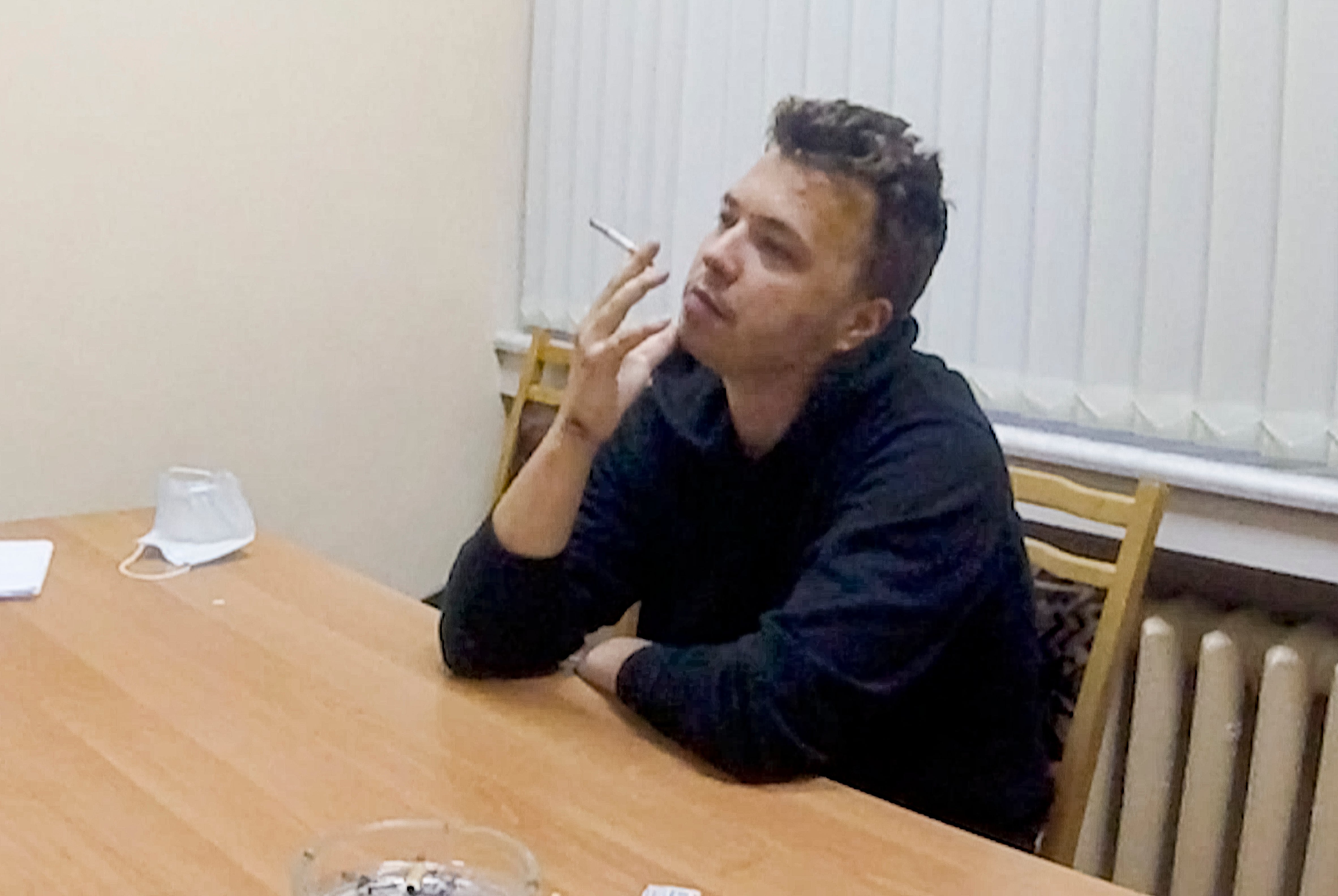Opposition: Belarusian dissident forced to confess on TV
Belarusian opposition activists say that a dissident journalist has been coerced to appear in a video on state TV in which he wept and praised the country’s authoritarian ruler

The Belarusian opposition said Friday a dissident journalist was coerced to appear in a video on state TV in which he wept and praised the country's authoritarian ruler.
In the 90-minute video aired Thursday night, 26-year-old Raman Pratasevich repented for his opposition activities and said he respects Belarus' President Alexander Lukashenko as "a man with balls of steel.”
His associates reacted with outrage, accusing the Belarusian authorities of forcing Pratasevich to smear himself and disavow the opposition.
Speaking on a visit to Poland, Sviatlana Tsikhanouskaya the main opposition candidate in Belarus’ presidential election last August, said that Pratasevich and other inmates speaking in videos from custody "are for sure being tortured and violated.”
Tsikhanouskaya's spokeswoman, Anna Krasulina, described Pratasevich as a hostage.
“He made his statements under tough physical and psychological pressure and, possibly, under drugs,” Krasulina told The Associated Press. “We demand the immediate release of Raman, who is used by Lukashenko's regime as a toy and instrument to blackmail Belarus' democratic forces.”
Pratasevich was traveling from Greece to Lithuania aboard a Ryanair flight on May 23 when Belarusian flight controllers ordered the pilots to land in Minsk citing a bomb threat. No bomb was found, but Pratasevich and his Russian girlfriend were arrested.
Speaking in a trembling voice and looking nervous in the program on state-controlled ONT channel, Pratasevich said the opposition was pondering plans for a forceful change of government and was locked in infighting to divide the funds offered by Poland and Lithuania.
Pratasevich, who ran a widely popular channel on the Telegram messaging app that helped organize months of protests against Lukashenko, also offered repentance for his action and said he pleaded guilty to the charges of organizing mass disturbances. The charges carry a 15-year prison sentence.
Pratasevich said he fears that he could face a death sentence on charges linked to him being part of a volunteer battalion that fought against Russia-backed separatists in eastern Ukraine He pleaded with Lukashenko not to hand him over to separatists who have launched a criminal probe against him.
In the end, he said, he was tired of political activism and only wants to have a family and live a normal life. Then he broke into tears, covering his face with his hands, scratches left by handcuffs clearly visible on his wrists.
Stsiapan Putsila, who co-founded the Nexta channel with Pratasevich, told The Associated Press that Pratasevich likely had been subjected to both “psychological pressure and specially designed drugs,” adding that the breakdown could be the result of medication.
“His statements had nothing to do with reality, they are the result of unbearable torture and exploitation of his emotions,” Putsila told the AP, adding that the authorities also have clearly brainwashed Pratasevich to try to convince him of his colleagues' betrayal.
Belarus has been rocked by months of protests triggered by Lukashenko's reelection to a sixth term in an August vote that was widely seen as rigged. The Belarusian leader has responded to the opposition demands to step down with fierce repressions. More than 35,000 people have been arrested and thousands beaten, and opposition leaders have been either jailed or forced to leave the country.
The program aired Thursday night marked Pratasevich's third appearance on state TV. In a brief video a day after his arrest, he confessed to staging mass disturbances, and in other remarks aired Wednesday he said demonstrations against Lukashenko had fizzled and the opposition should wait for a better moment to revive them. He also said that he had been set up by an unidentified associate.
Outraged European Union leaders responded to the flight diversion by barring the Belarusian flag carrier Belavia from the bloc’s airports and airspace and telling European airlines to skirt Belarus. They also drafted bruising new measures against the country’s top industrial enterprises, doubling down on sanctions previously introduced by the U.S. and the EU.
In Berlin Chancellor Angela Merkel’s spokesman said that “the German government condemns in the strongest terms this new presentation” of Pratasevich.
Steffen Seibert called the confession “completely unworthy and implausible.”
“This is a disgrace for the broadcaster that screened it and for the Belarusian leadership,” Seibert told reporters in Berlin.
___
Karmanau reported from Kyiv, Ukraine. Associated Press writers Vladimir Isachenkov in Moscow, Vanessa Gera in Warsaw and Geir Moulson in Berlin contributed to this report.